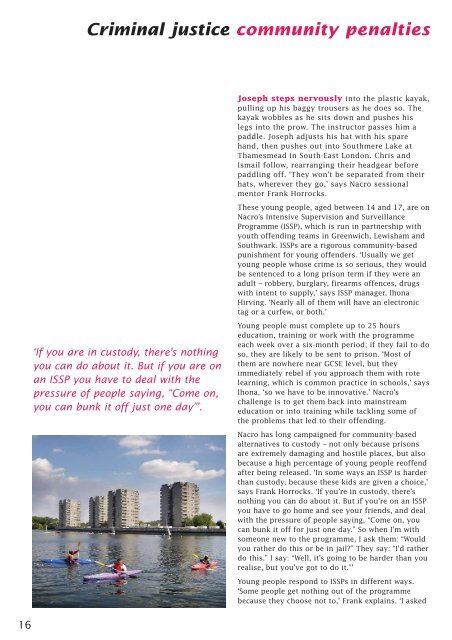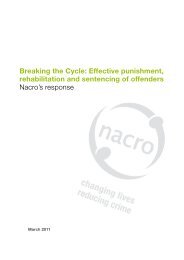Nacro annual review
Nacro annual review
Nacro annual review
- No tags were found...
Create successful ePaper yourself
Turn your PDF publications into a flip-book with our unique Google optimized e-Paper software.
Criminal justice community penaltiesJoseph steps nervously into the plastic kayak,pulling up his baggy trousers as he does so. Thekayak wobbles as he sits down and pushes hislegs into the prow. The instructor passes him apaddle. Joseph adjusts his hat with his sparehand, then pushes out into Southmere Lake atThamesmead in South-East London. Chris andIsmail follow, rearranging their headgear beforepaddling off. ‘They won’t be separated from theirhats, wherever they go,’ says <strong>Nacro</strong> sessionalmentor Frank Horrocks.These young people, aged between 14 and 17, are on<strong>Nacro</strong>’s Intensive Supervision and SurveillanceProgramme (ISSP), which is run in partnership withyouth offending teams in Greenwich, Lewisham andSouthwark. ISSPs are a rigorous community-basedpunishment for young offenders. ‘Usually we getyoung people whose crime is so serious, they wouldbe sentenced to a long prison term if they were anadult – robbery, burglary, firearms offences, drugswith intent to supply,’ says ISSP manager, IhonaHirving. ‘Nearly all of them will have an electronictag or a curfew, or both.’‘If you are in custody, there’s nothingyou can do about it. But if you are onan ISSP you have to deal with thepressure of people saying, “Come on,you can bunk it off just one day”’.Young people must complete up to 25 hourseducation, training or work with the programmeeach week over a six-month period; if they fail to doso, they are likely to be sent to prison. ‘Most ofthem are nowhere near GCSE level, but theyimmediately rebel if you approach them with rotelearning, which is common practice in schools,’ saysIhona, ‘so we have to be innovative.’ <strong>Nacro</strong>’schallenge is to get them back into mainstreameducation or into training while tackling some ofthe problems that led to their offending.<strong>Nacro</strong> has long campaigned for community-basedalternatives to custody – not only because prisonsare extremely damaging and hostile places, but alsobecause a high percentage of young people reoffendafter being released. ‘In some ways an ISSP is harderthan custody, because these kids are given a choice,’says Frank Horrocks. ‘If you’re in custody, there’snothing you can do about it. But if you’re on an ISSPyou have to go home and see your friends, and dealwith the pressure of people saying, “Come on, youcan bunk it off for just one day.” So when I’m withsomeone new to the programme, I ask them: “Wouldyou rather do this or be in jail?” They say: “I’d ratherdo this.” I say: “Well, it’s going to be harder than yourealise, but you’ve got to do it.”’Young people respond to ISSPs in different ways.‘Some people get nothing out of the programmebecause they choose not to,’ Frank explains. ‘I asked16
















